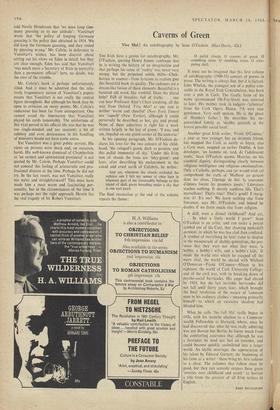Caverns of Green
Vive Moi ! An autobiography by Sean O'Faolain. (Hart-Davis, 42s.)
THE Irish have a genius for autobiography. Mr. O'Faolain, quoting Henry James, confesses that he is writing the history of an imagination and that perhaps his sense of 'reality' was never very strong; but the perpetual subtle shifts—Chek- hovian in essence—from lyricism to realism give this beautiful book its quality. The cadences are a dream-like fusion of these elements. Beautiful is a battered old word, like truthful. Does the plural help? Full of beauties, full of truths . . . one can hear Professor Ayer's Chair creaking, all the way from Oxford. Vive Moil at any rate is neither 'warm and cheerful' (New York Times) nor 'superb' (New Yorker), although it could perversely be described as hot, gay and proud. None of these adjectives is right for a work written largely in the key of green : 'I was, and am, impaled on one green corner of the universe.'
In his opening paragraph, Mr. O'Faolain de- clares his love for the two colours of his child- hood, 'the raingod's green, dark as passion, and this pallid immensity of sky.' Under this Irish tent of clouds the trees are 'inky-green'; and later, after describing his enslavement to the caked and cruel earth of Calabria, he writes:
And yet, whenever the clouds occluded the ruthless sun I felt my senses at once leap in whatever part of me irrevocably belongs to this island of dark green brooding under a sky that is one vast pearl.
The final invocation at the end of the volume repeats the theme:
O pallid clouds. 0 caverns of green. 0 crumbling ruins. 0 rumbling rivers. 0 whis- pering shell.
It must not be imagined that this first volume of autobiography (1900-33) consists of poems in prose. The writing is always fine, but it is factual. John Whelan, the youngest son of a police con- stable in the Royal Irish Constabulary, was born over a pub in Cork. The Gaelic form of his name (pronounced Oh-Fay-lawn) was reverted to later. His mother took in lodgers—'arteestes' from the Cork Opera House. CA very nice gentleman. Very well spoken. He is the ghost of Hamlet's father.') He describes his im- poverished' family as 'shabby genteels at the lowest possible social level.'
Another great Irish writer, 'Frank O'Connor,' a year or two younger but an intimate friend, has mapped this Cork as surely as Joyce, also a Cork man, mapped an earlier Dublin. A late developer, 'un hommc nd, tard, de l'adolescent veule,' Sean O'Faolain quotes Mauriac on his youthful dignity, distinguishing clearly between religious intelligence and religious emotionalism. Only a Catholic, perhaps, can (or would wish to) comprehend the truth of 'Malheur au garcon dont les clous, l'eponge de fiel, la couronne d'dpines furent les premiers jouets.' Literature teaches •nothing. It merely confirms life. That's marvellous! That's true! That's good! I recog- nise it! It's me! We learn nothing else from literature, says Mr. O'Faolain; and indeed he doubts if we learn much else from religion.
A dull, even a dismal childhood? And yet, . In what a lively world I grew!' Sean O'Faolain is an artist, and can make a potent symbol out of the Coat, that shaming makeshift garment, in which he was less clad than confined. A symbol of everything he later came to despise in the masquerade of shabby-genteelism, the pre- tence that they were not what they were, 'a bobby, a bobby's wife, and a bobby's kids.' It made the world into which he escaped all the more vital, the world he shared with 'Michael O'Donovan--Frank O'Connor—fifteen to his eighteen; the world of Cork University College; and Of the civil war, with its breaking down of psycho-social barricades. His anger had abated by 1924, but the last invisible barricades did not fall until thirty years later, which brought the final revelation of the nature of 'common man in his ordinary clothes'—meaning primarily himself—to which an excessive idealism had blinded him.
What he calls 'the full life' really began in 1926, with his surprise election to a Common- wealth Fellowship at Harvard, where, once he had discovered that what he was really admiring was not Boston but Berlin, he learnt much from the comforting assurance that although he was a foreigner he need not feel an outsider, and could become quickly assimilated into a larger world. An idyllic marriage; the appreciation of his talent by Edward Garnett; the beginning of his fame as a writer—these bring his first volume to a close. The volumes that follow must be good, but they can scarcely'surpass these green `reveries over childhood and youth' to borrow a title from the greatest of all Irish writers in English.
JOHN DAVENPORT














































 Previous page
Previous page